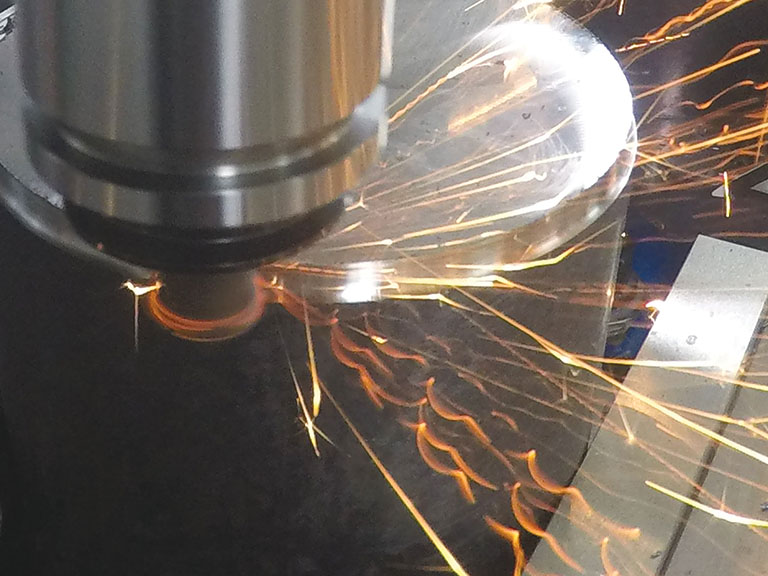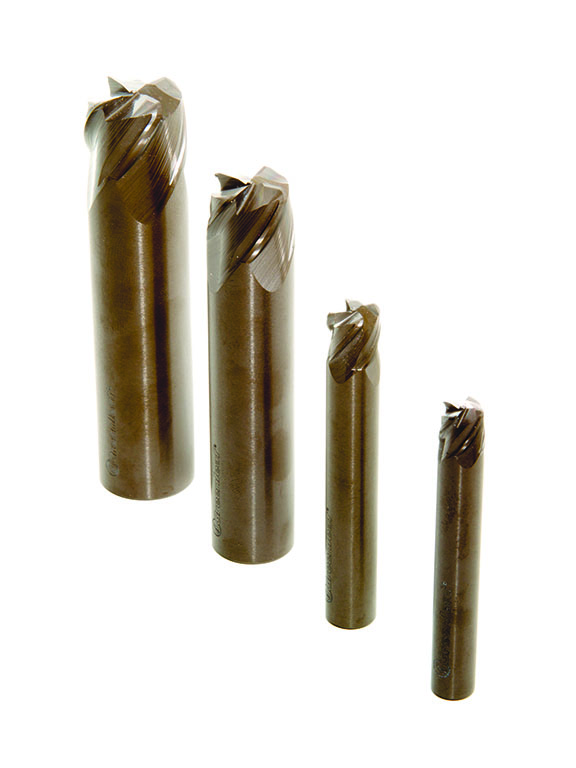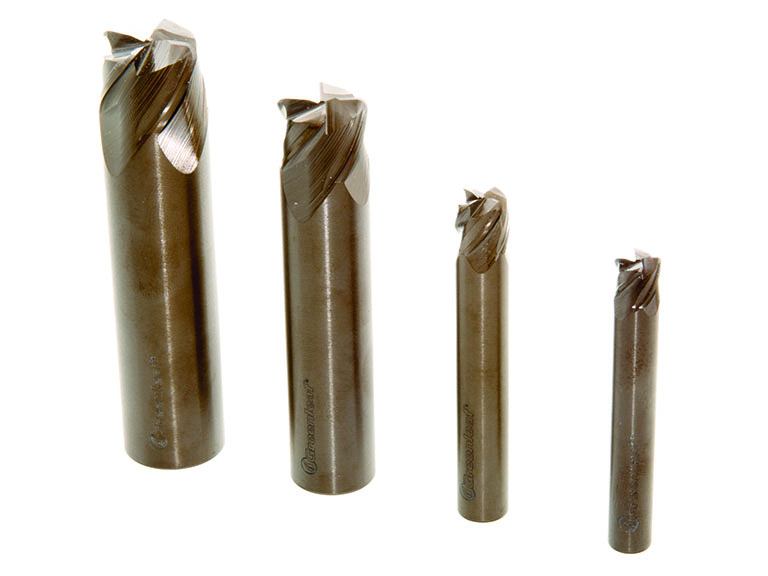 Greenleaf Corp. in Saegertown, Pennsylvania, released the XSYTIN-360, a new line of high-performance solid ceramic end mills, to the global market.
Greenleaf Corp. in Saegertown, Pennsylvania, released the XSYTIN-360, a new line of high-performance solid ceramic end mills, to the global market.
In a global Zoom meeting announcing the new round end mills, Jim Greenleaf, president and CEO of Greenleaf Corp., said that the XSYTIN-360 is “one of our better announcements of the last several years.” The ceramic round tool product, Greenleaf said, has “been in development for more than two years, and is one of the most extensively tested products we’ve ever introduced.”
“It is made with the strongest material on the market, and the geometry is unparalleled,” he added. “[We’ve] produced the longest lasting, highest strength round tool.”
The end mills combine Greenleaf’s phase-toughened XSYTIN-1 substrate with a cutting geometry that Bernie McConnell, executive vice president – commercial at Greenleaf said offers as much as ten times higher productivity and cost savings. The strength of the material allows the user to apply chip loads similar to solid carbide end mills with higher speeds common to ceramic machining. These new ceramic end mills provide customers with significant increases in productivity over current solid carbide or ceramic products.
Greenleaf’s XSYTIN-1 mat erial, introduced in 2016, was engineered to machine a wider variety of materials than any other ceramic in the industry, according to the company. The structure of this phase-toughened ceramic exhibits high wear resistance and outstanding thermal shock resistance, which makes the XSYTIN-360 end mills highly predictable, versatile, high-performance products.
erial, introduced in 2016, was engineered to machine a wider variety of materials than any other ceramic in the industry, according to the company. The structure of this phase-toughened ceramic exhibits high wear resistance and outstanding thermal shock resistance, which makes the XSYTIN-360 end mills highly predictable, versatile, high-performance products.
"What you saw here today was the XSYTIN-360 [showing] anywhere from 4 to 10 times increase in productivity." said McConnell. "That is game-changing performance."
He added that the material can be used on a wide variety of machinery. "You don’t need to have machining centers with 25,000 or 35,000 spindle rpms. You can run it on most machining centers that are in the shops today because of the toughness and strength of the XSYTIN-360 material combined with the cutting tool geometry. It really opens up the market opportunity for XSYTIN-360 and it is truly a differentiator for us."
During the virtual announcement, Matt Goss, application engineer and project development for Greenleaf, detailed multiple studies that he said showed the XSYTIN-360 end mills achieved high material removal rates and increased productivity on a wide range of materials.
For example, in one test case, the company used hardened 4150 steels with 53 to 55 Rockwell strength, and the tool achieved an almost 6X increase in cutting speeds, and a 28 percent increase in the feed per tooth.
“Hardened 4150 steel isn’t a material that is really targeted with a typical ceramic endmills, but we found that the combination of the XSYTIN-1 base material and our unique flute geometry, we able to perform very well and get very good tool life,” said Goss. “There was also a drastic reduction in cycle time. We saw a reduction in cycle time of over six hours. It would take carbide six hours or more of cut time, and we were doing it in less than one hour.”
 The end mills have proven to be extremely effective when machining a variety of different materials including high-temperature alloys, 3D-printed sintered high-temperature alloys, hardened steels, ductile cast irons, and compacted graphite iron (CGI). In hardened steels specifically, the tool life of XSYTIN-360 end mills has proven to be equal to high-performance carbide end mills when run at high-end speeds (11,460 RPM), while also removing more than 73 cubic inches (over 1200 cubic cm) of material.
The end mills have proven to be extremely effective when machining a variety of different materials including high-temperature alloys, 3D-printed sintered high-temperature alloys, hardened steels, ductile cast irons, and compacted graphite iron (CGI). In hardened steels specifically, the tool life of XSYTIN-360 end mills has proven to be equal to high-performance carbide end mills when run at high-end speeds (11,460 RPM), while also removing more than 73 cubic inches (over 1200 cubic cm) of material.
Features of the XSYTIN-360 end mills include:
- Unique flute design minimizes cutting forces, which reduces vibrations and optimizes tool life.
- XSYTIN-1 ceramic material provides ultra-high strength and wear resistance at extreme feed rates.
- Four-flute design allows for maximum material removal in slotting, pocketing, and profiling applications.
- Overall length of the end mills provides the option for regrind capabilities.
- A very broad application range means numerous machining centers are capable of running these end mills.
- Extremely versatile end mills with twice the feed rate capability and a much broader speed range.
- Increased material removal rates (MRR) of 100% over carbide solutions.
“This is the beginning of our entry into this arena,” said McConnell during the meeting. “There is already the next generation of product portfolio expansion in the works, and we are tremendously excited about that. More to come, very soon.”
For more information about this product, visit www.greenleafcorporation.com/xsytin-360.php or phone 814-763-2915.
Contact Details
Related Glossary Terms
- alloys
alloys
Substances having metallic properties and being composed of two or more chemical elements of which at least one is a metal.
- cast irons
cast irons
Cast ferrous alloys containing carbon in excess of solubility in austenite that exists in the alloy at the eutectic temperature. Cast irons include gray cast iron, white cast iron, malleable cast iron and ductile, or nodular, cast iron. The word “cast” is often left out.
- centers
centers
Cone-shaped pins that support a workpiece by one or two ends during machining. The centers fit into holes drilled in the workpiece ends. Centers that turn with the workpiece are called “live” centers; those that do not are called “dead” centers.
- compacted graphite iron
compacted graphite iron
Cast iron having a graphite shape intermediate between the flake form typical of gray cast iron and the spherical form of fully spherulitic ductile cast iron. Also known as CG iron, CGI or vermicular iron, it is produced in a manner similar to that of ductile cast iron but using a technique that inhibits the formation of fully spherulitic graphite nodules.
- ductile cast irons
ductile cast irons
Ferrous alloys in which graphite is present as tiny balls or spherulites. The spheroidal graphite structure is produced by adding one or more elements to the molten metal, among which magnesium and cerium are commercially important. Approximate composition of ductile cast irons is: 3.0 to 4.0 percent carbon, 0.1 to 1.0 percent manganese, 1.8 to 2.8 percent silicon, 0.1 percent (maximum) phosphorus and 0.03 percent (maximum) sulfur. Typical ductile cast iron grades are D-4018, D-4512, D-5506 and D-7003 by definition of the Society of Automotive Engineers; 60-40-18, 65-45-12, 80-55-06, 100-70-03 and 120-90-02 by definition of the American Society for Testing and Materials. Also known as nodular cast irons.
- feed
feed
Rate of change of position of the tool as a whole, relative to the workpiece while cutting.
- profiling
profiling
Machining vertical edges of workpieces having irregular contours; normally performed with an endmill in a vertical spindle on a milling machine or with a profiler, following a pattern. See mill, milling machine.
- sawing machine ( saw)
sawing machine ( saw)
Machine designed to use a serrated-tooth blade to cut metal or other material. Comes in a wide variety of styles but takes one of four basic forms: hacksaw (a simple, rugged machine that uses a reciprocating motion to part metal or other material); cold or circular saw (powers a circular blade that cuts structural materials); bandsaw (runs an endless band; the two basic types are cutoff and contour band machines, which cut intricate contours and shapes); and abrasive cutoff saw (similar in appearance to the cold saw, but uses an abrasive disc that rotates at high speeds rather than a blade with serrated teeth).
- slotting
slotting
Machining, normally milling, that creates slots, grooves and similar recesses in workpieces, including T-slots and dovetails.
- wear resistance
wear resistance
Ability of the tool to withstand stresses that cause it to wear during cutting; an attribute linked to alloy composition, base material, thermal conditions, type of tooling and operation and other variables.

